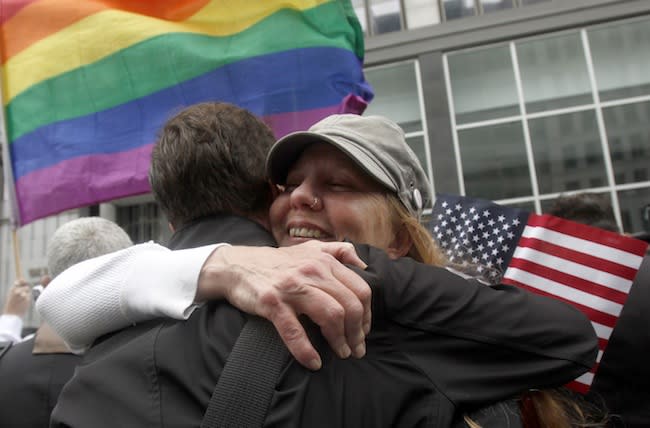 The Lookout
The LookoutProp. 8 overturned in California, court says state can’t ban gay marriage

The 9th Circuit Court in California struck down as unconstitutional the state's voter-passed ban on gay marriage Tuesday, ruling 2-1 that it violates the rights of gay Californians.
[View a slideshow of demonstrations around Prop. 8 here]
"Proposition 8 serves no purpose, and has no effect, other than to lessen the status and human dignity of gays and lesbians in California, and to officially reclassify their relationships and families as inferior to those of opposite-sex couples," Judge Stephen Reinhardt wrote in the decision. The court concludes that the law violates the 14th Amendment rights of gay couples to equal protection under the law. Access to gay marriage will remain on hold pending appeals to the decision.
You can watch an ABC News report on the ruling below:
The Circuit Court backed up District Judge Vaughn Walker, who ruled in August of 2010 that the state of California has no "rational basis" to single out gay men and women as ineligible for marriage. The group fighting for Prop. 8, which passed in 2008 after thousands of gay couples had already married, appealed Walker's decision arguing that it should be vacated because Walker is gay and has a same-sex partner. The 9th Circuit Court judges denied this motion.
Walker's sweeping 2010 decision was called a "grand slam" by gay rights advocates, who hoped it would convince the Supreme Court to rule states cannot outlaw gay marriage. But Reinhardt was explicit in his decision that his ruling is "narrow" and only relates to California, not to the entire nation. In California, gay people had the right to marry for five months before it was taken away by voters. This amounts to a violation of equal protection because a right was specifically taken away from a minority group, Reinhardt writes. But this argument would not apply to gay people in most other states, where gay marriage was never legalized in the first place. "It's a strong decision but it is not the ringing endorsement of broader marriage equality that some might have hoped for," Hunter College professor and gay rights advocate Kenneth Sherrill said.
But University of California Irvine law professor Erwin Chemerinsky tells Yahoo News that the underlying reasoning in the decision is broad--there's no legitimate state interest in denying same-sex marriage rights. Chemerinsky noted that the decision appeals to swing vote Supreme Court Justice Anthony Kennedy, by citing his decision in a 1996 case striking down a Colorado law that prevented communities from treating gay people as a protected class.
Ted Olson, the U.S. solicitor general under President George W. Bush who represents the plaintiffs, said at a press conference that the decision is the first step to ending discrimination. "Today we are more American because of this decision," he said.
The pro-Prop. 8 camp has said it will appeal the decision. The group can now ask for 11 members of the 9th Circuit hear their case, instead of just the panel of three who decided against them on Tuesday. "Today's ruling finally clears the field for an appeal to the United States Supreme Court, where we are confident we will be victorious," the Save Prop 8 campaign said in a statement.
Republican presidential candidate Mitt Romney released a statement saying the "fight" over states' rights to ban gay marriage is not over. "Today, unelected judges cast aside the will of the people of California who voted to protect traditional marriage," he said, adding that he would appoint judges who oppose same-sex marriage if he's elected. President Obama also opposes same-sex marriage, but says that his opinion on the issue is "evolving."
Correction: An earlier version of this article misstated the number of judges on the 9th Circuit.
Other popular Yahoo! News stories:
Want more of our best political stories? Visit on Facebook, follow us on Twitter, or add us on Tumblr.
Handy with a camera? Join our Election 2012 Flickr group to submit your photos of the campaign in action.


